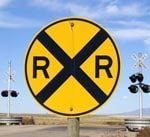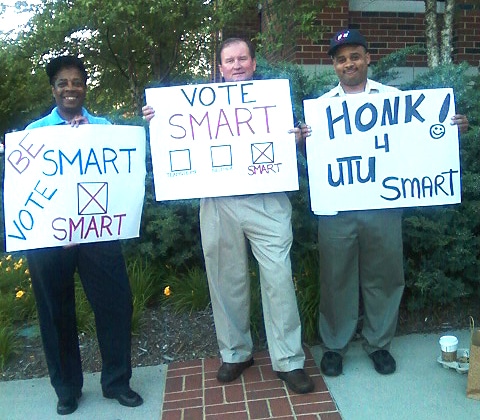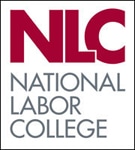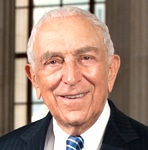
Increasing the contributions of the SMART Transportation Division’s input in shaping public transportation policy, SMART Transportation Division General Secretary & Treasurer John Previsich May 30 was named to the U.S. Department of Transportation’s National Freight Advisory Committee by DOT Secretary Ray LaHood.
The committee is a diverse group of professionals that will provide advice and recommendations aimed at improving the national freight transportation system.
LaHood said a strong freight transportation system is critical to the nation’s economy and is essential for helping meet President Obama’s goal of doubling U.S. exports by 2015.
“The strength of our economy and the strength of our national freight system go hand in hand,” LaHood said. “The members of this committee understand firsthand the critical importance of freight movement, and their valuable insight will help ensure that our system is more secure and better connected.”
Previsich was nominated for the panel by SMART Transportation Division President Mike Futhey.
“This appointment will permit the concerns of our members in the rail, airline and bus transportation industries to be placed squarely on the table for consideration and inclusion in the talks leading to the establishment of a ‘national freight plan’ for the 21st century,” Previsich said.
“The inclusion of labor representatives at the highest level of such discussions is an opportunity for input into the decision making process that will benefit our members, and all of labor, for years to come.
“The Obama administration deserves credit for ensuring that the interests of working people are a part of the nation’s long term transportation planning.”
Members of the committee provide various perspectives on freight transportation and represent various modes of transportation, geographic regions, and policy areas. Freight customers and providers, labor representatives, safety experts and government entities are all represented.
By engaging members representing diverse interests, the committee will provide recommendations to the secretary of transportation on how DOT can improve its freight transportation policies and programs.
The DOT solicited nominations in February and LaHood selected members with input from the MAP-21 Freight Implementation Team, as well as the Freight Policy Council, an internal body of DOT leadership created to facilitate cross-modal implementation of freight provisions in the recently signed surface transportation bill, Moving Ahead for Progress in the 21st Century, or MAP-21. MAP-21 established a national freight policy and called for the creation of a National Freight Strategic Plan.
Over the last four years, the Obama Administration has made considerable investments in our national freight network. Through four rounds of the TIGER Grant program, DOT has directed $1 billion toward projects that primarily address freight. This includes more than $650 million to projects that strengthen freight rail infrastructure, reduce freight bottlenecks and alleviate congestion issues.
Members will serve two-year terms and meet at least three times per year. The first NFAC meeting is scheduled for June 25, 2013, at the Department of Transportation and will include an overview of MAP-21 freight provisions and preliminary identification of NFAC activities.
 The Federal Railroad Administration June 3 issued a safety advisory on the importance railroad safety procedures to ensure the safety of the traveling public and railroad employees when highway-rail grade crossing warning systems and wayside signal systems are temporarily removed from service for purposes of testing, inspection, maintenance, or repair.
The Federal Railroad Administration June 3 issued a safety advisory on the importance railroad safety procedures to ensure the safety of the traveling public and railroad employees when highway-rail grade crossing warning systems and wayside signal systems are temporarily removed from service for purposes of testing, inspection, maintenance, or repair. Facing strong opposition from flight attendants and lawmakers, the Transportation Security Administration said Wednesday that it was abandoning a plan to allow passengers to carry small knives on board.
Facing strong opposition from flight attendants and lawmakers, the Transportation Security Administration said Wednesday that it was abandoning a plan to allow passengers to carry small knives on board. CHARLOTTE, N.C. – SMART Transportation Division organizers, representatives and members of Local 1715 at Charlotte, N.C., have turned back the International Brotherhood of Teamsters in an attempted raid of SMART membership.
CHARLOTTE, N.C. – SMART Transportation Division organizers, representatives and members of Local 1715 at Charlotte, N.C., have turned back the International Brotherhood of Teamsters in an attempted raid of SMART membership.
 The Rail Workers Hazardous Materials Training Program prides itself on delivering the most valuable worker safety training available. Peer instructors are members of the railroad labor community and take pride in offering the latest and most up-to-date information, teaching techniques and peer support.
The Rail Workers Hazardous Materials Training Program prides itself on delivering the most valuable worker safety training available. Peer instructors are members of the railroad labor community and take pride in offering the latest and most up-to-date information, teaching techniques and peer support.
 The SMART Transportation Division’s legislative officers attended a public-input meeting held by the U.S. Department of Transportation May 29 to study truck size and weight limits.
The SMART Transportation Division’s legislative officers attended a public-input meeting held by the U.S. Department of Transportation May 29 to study truck size and weight limits.